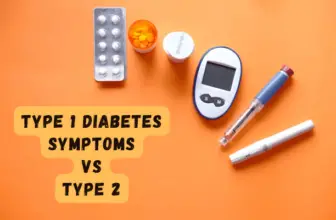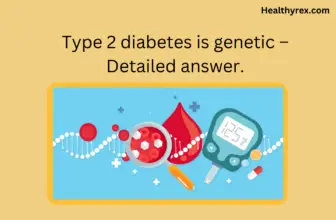Does Insulin Make You Hungry? Learn More About It
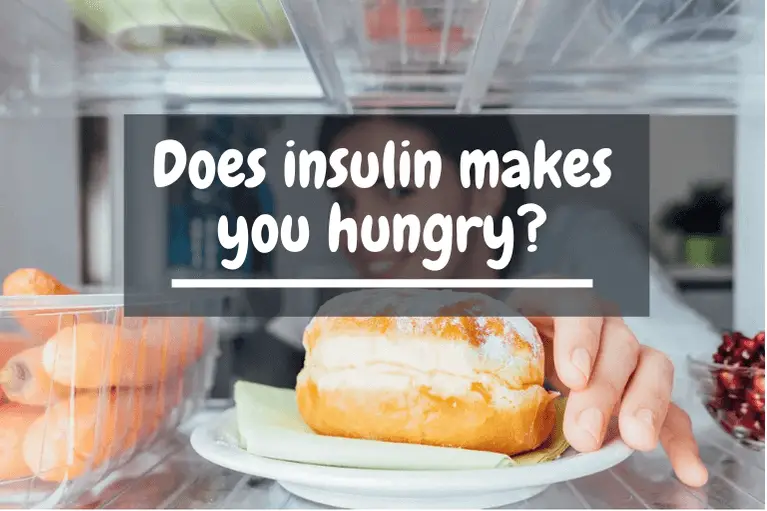
There are three main symptoms often experienced by diabetic patients that are famous as a triad of symptoms. These symptoms include polyphagia, polydipsia, and polyuria, which increase hunger, thirst, and urination, respectively. Our primary focus is to clear your frequently asked question in this article, does insulin make you hungry?
In this article, you will find all the information related to the science behind how insulin makes you hungry, what it means, and how to control it.
Why Does Diabetes Cause Hunger?
In the case of a healthy and robust body, insulin works by turning your food into energy. Your blood sugar level rises when you eat your food. As a result, the pancreas produces insulin released into your bloodstream through which glucose enters your muscles, liver, and fat. It is used by the body when needed and is either stored for later.
Unfortunately, in the diabetic condition, the insulin either doesn’t work correctly or maybe your body is not producing it according to your body’s requirement. When there is a shortage of insulin, your blood sugar will remain in your bloodstream, putting your cells and muscles in lack of energy. In these circumstances, you may experience a feeling of hunger and craving for food.
Reasons why insulin makes you hungry?

The blood sugar level higher than the normal in the body is known as hyperglycemia. It occurs when there is no or too little insulin in the body, or it may not be performing its function correctly. In this condition, the body will not be able to convert food into energy properly. In this case, your body will still crave more food to get more energy.
You will continuously feel the hunger in this situation, and unfortunately, despite eating, you will still feel hunger. On the other hand, this continuous eating will cause your blood sugar level to increase more than usual.
-
Hypoglycemia and Hunger
Low blood sugar level and Hypoglycemia can increase your hunger cravings and appetite. In a healthy person, when there is a low blood sugar level in the body, then the glucose already stored from our liver releases for balancing the glucose levels.
Diabetic patients can generally regulate their blood sugar level as an average person and have to take medicines like sulfonylureas and insulin. This condition also increases the risk of Hypoglycemia. During these hunger cravings, a person has to eat to raise the blood sugar levels.
-
Importance of Checking whether You Need Food or Insulin
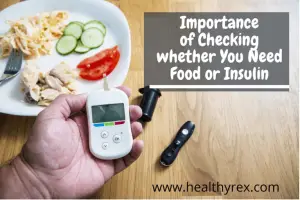
In the case of diabetes, it becomes essential to know the reason behind your surplus hunger. You should talk to your doctor and explain your regular diet and the symptoms you are facing. They may advise some tests or changes in medication and diet to bring your glucose level under control.
The reason behind more hunger can be your high blood glucose level as well as low blood sugar level. If you are experiencing excessive hunger, then you should first check your blood glucose level. The results will be according to the sugar levels, whether it is high or low.
-
When You Have High Blood Sugar Levels
If you have a high blood sugar level, then there are chances that the leading cause behind your excess hunger might be the insulin level that is not working correctly to feed your baby. If you find this as the cause behind your finger, then talk with your doctor to adjust the insulin level.
By improving your physical activities and adjusting your daily diet, your body can change the glucose into your cells more effectively. Thus the solution to your excess hunger is not eating more but adjusting your medicines, diet, and physical routine.
When you eat every time you feel hungry without even knowing its cause, then it can increase your sugar levels to a dangerous level. In diabetes, due to excessive heating, the result can be an unhealthy weight loss. In case of severe Hypoglycemia, unhealthy weight loss can be harmful to your body.
-
When You Notice Your Blood Glucose Levels are Low
If the reason behind your food cravings is your low blood glucose level, then your body is showing you sign that it needs food, and to maintain its level, you have to eat. In such cases, to keep your blood glucose levels, you need fast-acting carbohydrates like crackers and juices. If still, your blood sugar level is not average, then eating food may work.
If you are facing low glucose levels constantly, you should contact your doctor to have a better plan for your diabetic management. In different people, the cause of hunger may vary; thus, it is a better option to consult your nutritionist or doctor to create a balanced management and treatment plan. It might be possible that your hunger level may decrease or stop together because you have your diabetes under control.
The standard diabetes treatment is insulin resulting in weight gain for many people. In maximum cases, with a few changes in diet and lifestyle, you can manage your weight gain due to insulin. Insulin is a hormone in your blood that regulates your blood sugar level, and the other name for insulin is blood sugar. This hormone helps the body cells to absorb glucose.
Insulin can be the cause of weight gain due to the maximum absorption and conversion of glucose into fat. Here are some points that will explain the relationship between weight and diabetes, why insulin makes you hungry, and especially the helpful tips to avoid insulin-related weight gain.
The link between insulin and your weight

Insulin is a vital hormone in our body that helps in the conversion of food energy into fat. Besides, I also work in breaking down fats and proteins. During digestion, the absorption of glucose-insulin helps in the stimulation of fat muscles and liver cells. The cells either convert this glucose for energy or may convert it into fat.
The cause of excess glucose level is usually taking more calories than the actual needed by the body. If the cells are not removing excess glucose, then it can store as fat in your tissues. When you are using insulin to control your diabetes, you may gain more weight due to more glucose absorption than average.
Besides, if you are not treating your diabetes, it can result in unhealthy weight loss. Insulin intake can be a solution to this problem because weight gain is commonly observed at the start of taking insulin.
Diabetes and weight gain
Weight gain is a general symptom of insulin-related health conditions and diabetes. Diabetic adults, especially young ones, have a high risk of developing obesity and considerable body weight than others.
According to the estimation of WHO 2003, 90 % of people having type 2 diabetes are either overweight or have obesity. Obesity is a side effect of insulin therapy, and besides, insulin makes you hungry. Because again, regulating the sugar level helps to promote fat storage in the body.
By reducing your excess weight, you can help your body manage the symptoms of insulin resistance and pre-diabetes.
Does insulin make you hungry? It could be insulin resistance.
Are you always feeling hungry, sluggish, and fatigued no matter what you are eating? Then you might be suffering from insulin resistance that can result in diabetes. Are you feeling hungry even after 30 minutes of having your lunch? You may feel weak and shaky and always tired.
Is this you?
Then you might be unaware of your current situation that can even put you at a high risk of type 2 diabetes.
What is the role of insulin?
Insulin resistance occurs when your body cannot absorb and utilize insulin; it results in a high blood sugar level. The pancreas is an organ behind your stomach that produces the hormone insulin, which plays its role in regulating glucose levels.
The role of insulin is to allow the body to absorb glucose and use it as fuel or store it as fat. After a meal, blood sugar level rises, and the pancreas releases insulin to help our fat, muscle, and liver absorb glucose.
Insulin can also lower blood sugar levels by reducing the production of glucose in the liver. If you have a strong and healthy body, your body will automatically regulate your blood glucose level.
What happens during insulin resistance?
When your muscles are not adequately absorbing blood glucose and from your blood and things go pear-shaped because the cells are not sufficiently responding to insulin. To help in the absorption of glucose, your body needs more insulin. As your pancreas is trying its best to make up the higher insulin demand, it may start to fail, resulting in pre-diabetic and type 2 diabetes.
What are the symptoms of insulin resistance?
The symptoms of insulin resistance may not appear or can be seen after some time. Though some signs clearly show your insulin is not functioning properly.
- Regular cravings for sugar
- Low levels of good cholesterol
- Instead of extreme efforts not being able to lose weight
- Weight gain on the belly region
- Difficulty in concentration on work
- Lethargy, especially after eating.
Do you have insulin resistance?
Here is a small list that increases the risk of a person’s insulin resistance.
A waist measurement of more than 88 in women and above 102 cm in men.
The blood test shows you have a triglyceride level of more than 1.7 mmol/L or if you are already on drug treatment for triglyceride.
If your blood test reveals that you have low levels of good cholesterol, also known as HDL cholesterol. It is a level less than 1.3 mmol/L in women and 1.03 mmol/L in men.
If you are on medication to control blood pressure or have high or slightly raised blood pressure of 130 mmHg or 85 mmHg diastolic pressure.
If you have taken a test that reveals a High blood glucose level greater than 5.6 mmol/L after a night fast.
When insulin resistance results in pre-diabetics, you might experience these common symptoms:
- Fatigue
- Blurred vision
- Excessive thirst
- Increased blood glucose levels
- Increased urination
Who is at the maximum risk for insulin resistance?
If you are pre-diabetic and have an improper lifestyle, you are more at risk of developing insulin resistance. Because it is mostly linked to adopting unhealthy lifestyles and you are probably at high risk if you
- Are overweight or obese
- Having parents or siblings with diabetes
- Currently suffering from high blood pressure
- Living a sedentary lifestyle
What can you do about insulin resistance?
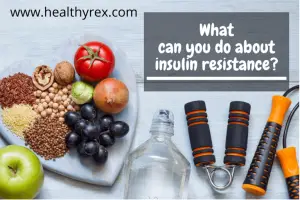
There are different ways to reverse insulin resistance, and firstly the critical step is to make positive changes in your exercise and diet routine.
- Quit smoking
- Manage your stress levels
- Regularly monitor your cholesterol and blood pressure
- Keep track of your blood sugar levels
- Consult a dietician who can tell you about a low-carb diet
- Eat a healthy and balanced diet having whole grains, vegetables, fruits, healthy fats, and lean proteins
- Avoid weight gain while taking insulin
To prevent unwanted weight gain while using insulin, you should be physically active and eat healthy foods. To keep your pounds off, here are some healthy tips.
-
Count calories
To prevent excessive weight gain, you should fewer your eating and drinking calories. Stock your refrigerator with healthy vegetables, fruits, and whole grains. To have the right mix of protein, starches, fats, fruits, and vegetables, make your proper diet plans.
Generally, according to experts, meals consist of one-quarter starch such as vegetables like peas or corn, one-quarter of protein, and half of the non-starchy vegetables. Instead of drinks having high calories take water, skip second helpings, and trim your portion size. To take care of your meal, planning strategies, talk with your doctor, dietician, or nurse.
-
Don’t skip your meals
Try not to skip your meals because generally, when we miss our one meal, we are probably making poor diet choices in our next one because we are hungry. Skipping meals can result in low blood sugar levels in case you are not maintaining your glucose levels.
-
Be more physically active
Physical activity burns more calories, and for moderately intense aerobic exercise, at least 150 minutes per week should be the time. These aerobic activities include bicycling, dancing, walking, water aerobics, gardening, and maybe muscle strengthening exercises.
To make the best choice consult your doctor about the exercise that suits you. Because physical activity is the best way to help your body by using insulin more effectively, insulin intake also depends on your physical activity. When you are doing good physical exercise, you may not need the same amount of insulin. Besides, your blood glucose level may drop after hours of exercise; thus, you need to take care of your diet.
-
Regular exercise
Regular exercise not only keeps your body healthy and robust but also helpful in regulating blood sugar levels, burning calories, and promoting weight loss; according to WHO the adults having an age range of 18 to 64 must aim for 150 minutes of exercise in a week. The people suffering from type 2 diabetes and insulin resistance should learn more about structured exercise programs to benefit.
-
Working with a healthcare team
The health care team can help people who are struggling hard to maintain a healthy weight. You must consult your doctor instead of adopting your friend’s or relative’s diet and exercise plan. As the main reason behind this individualized planning is that the same diet plan can never fit all individuals with different body conditions.
You should consult a Registered Dietitian to advise some helpful diet according to your current health. RDs can help you in developing your personalized meal plans. They can help you improve your health and lower the risk of many diseases, such as cardiovascular diseases, obesity, and diabetes.
To have an idea of your overall health, they can recommend some tests like lipid profiles, glucose, and may be of insulin. You can also keep track of your progress towards your health goals with this information.
-
Discuss your diabetes medications with your doctor
Some medicines that are extremely helpful in maintaining your blood glucose level includes dulaglutide (Trulicity), metformin (Fortamet, Glucophage, others), liraglutide (Victoza), albiglutide (Tarzeum), sitagliptin dapagliflozin (Farxiga), pramlintide (Symlin), saxagliptin (Onglyza), (Januvia), exenatide (Byetta), canagliflozin (Invokana), empagliflozin (Jardiance). Discuss with your doctor about the best medicine that is perfect for your diabetes control plan.
-
Take your insulin correctly according to instructions
Do not reduce or skip your insulin dosage without discussing it with your doctor. It might be possible that by reducing your insulin dosage without consulting the doctor, you can shed pounds, but then the risk is beyond serious as well; without the proper level of insulin, your glucose level increases, leading to some severe complications in your diabetes and overall health as well.
FAQ’s
-
Does insulin cause hunger?
In cases when you have uncontrolled diabetes where your blood glucose level usually remains high means hyperglycemia. In such a situation, glucose cannot enter your cell either due to the lack of protein or may be due to insulin resistance. Thus will not convert your food into energy, and lack of energy causes hunger feelings.
-
Can I avoid the weight gain on insulin?
Absolutely, by making little positive changes in your lifestyle, diet, and exercise, you can prevent weight gain. Here are a few tips:
- Be more physically active
- Count your calories
- Keep track of your sugar levels
- Talk with your doctor about your current conditions and discuss your medications
- Take your insulin according to the prescription; don’t change it by yourself
- Don’t skip your meals
-
Can a person with diabetes go all day without eating?
It is a common practice to skip a meal, but if you have diabetes, then missing meals can disturb your balance between food and medicines. It can either result in low blood sugar hypoglycemia or maybe high blood sugar hyperglycemia, and it’s dangerous.
Related Reading:

